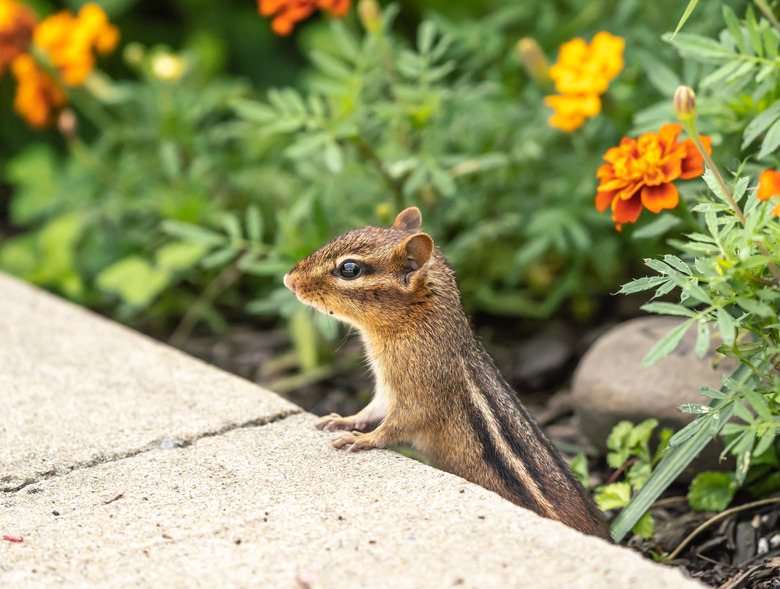Homemade Chipmunk Repellent
We may receive a commission on purchases made from links.
If you saw old Disney cartoons growing up, you may have been misled by Chip and Dale. Those mischievous chipmunks were downright adorable. Real chipmunks can be a nuisance, especially for gardeners whose plants they destroy. Still, you'd rather not kill them if you can help it. Starting with humane homemade repellent is a good first step for combatting a chipmunk problem in your yard.
Identifying Chipmunks in the Yard
Identifying Chipmunks in the Yard
Before taking any steps to get them out of your yard, verify that chipmunks are the ones doing damage to your plants. There are a few dozen species of chipmunks, but they all look fairly similar. Mature chipmunks have 4- to 7-inch-long bodies and bushy tails measuring around 3 to 5 inches long. They can be gray, brown, or reddish and generally have lighter or darker stripes down their cheeks and backs.
Chipmunks don't generally cause property damage, try to get into homes, or act aggressively toward people or pets. They build underground burrows, so you may notice chipmunk holes in your yard measuring a few inches wide. They come out to eat — and they'll eat just about anything. Chipmunks may eat seeds, grain, insects, nuts, mushrooms, and even sometimes baby mice, and they really love fruits, vegetables, and flower bulbs. If you notice signs of digging in flower beds and your fruits or veggies are being eaten up, chipmunks are a likely culprit.
Homemade Chipmunk Repellent Ideas
Homemade Chipmunk Repellent Ideas
Gardeners have found many clever ways to naturally repel rodents from their gardens like planting mint to repel rats or lavender to repel rodents and insects. Some even sprinkle human hair clippings around plants! One of the more common ways that gardeners try to repel chipmunks is by spritzing affected plants with cayenne pepper spray as the capsaicin in peppers tastes unpleasant to rodents, rabbits, and some other garden pests.
There are a few ways to make your own pepper spray. You could finely chop a few hot peppers, simmer them in a few cups of water for a few minutes to release their heat, let the mixture cool, carefully blend it, strain out the solids, and transfer the liquid to a clean spray bottle — all while wearing gloves and eye protection to guard against the fumes. Or you can choose a much easier approach by boiling 1 quart of water with 2 tablespoons of cayenne pepper for a few minutes, letting it cool and pouring the liquid into a spray bottle. Or simply mix a few tablespoons of your favorite hot sauce with water.
However you make your pepper spray, add a few drops of liquid soap at the end. This will help the solution stick to the plant long enough for it to dry so the faint pepper taste remains if a chipmunk bites into it. Wait for a day with no wind because even a slight breeze could blow the pepper spray back into your face; then spray your mixture all over any plants that chipmunks have targeted. The downside of this strategy is that you'll have to reapply the pepper spray frequently to keep rodents away, and using it on any edible plants means they may retain some spice when you harvest them.
Logical Next Steps
Logical Next Steps
After spraying your homemade repellent onto plants, look around your yard for other things that might be attracting chipmunks. Take down any bird feeders because chipmunks know to scour the ground below these feeders for spilled grain and seeds. Make sure any bird food, grass seed, or pet food is stored in sealed containers, not in plastic bags. Dripping hoses or puddles of standing water may also draw thirsty chipmunks and other rodents to your yard.
If your homemade repellent doesn't keep chipmunks from damaging your plants, you may experiment with rodent repellent spray to see whether a commercial product yields better results. Some people have had success using ultrasonic repellent spikes, which use sonic pulses to get rid of burrowing animals like groundhogs and chipmunks.
References
- University of New Hampshire: Chipmunks in the Garden
- Wiley Online Library: Restoration Ecology: Spicing up Restoration: Can Chili Peppers Improve Restoration Seeding by Reducing Seed Predation?
- Cornell University Cooperative Extension of Rockland County: Chipmunks
- National Geographic: Chipmunks
- Humane Society of the United States: What To Do About Chipmunks
- Square Foot Gardening Foundation: DIY Organic Pesticide Sprays
